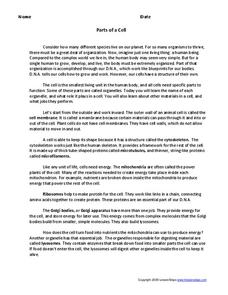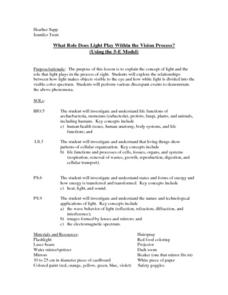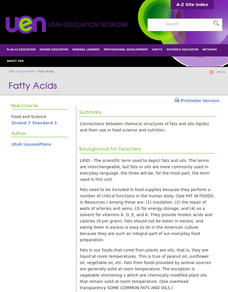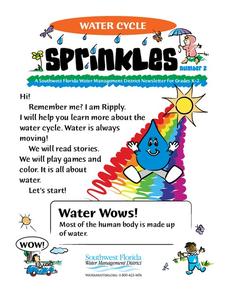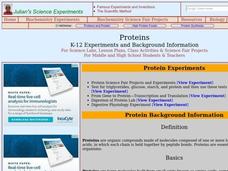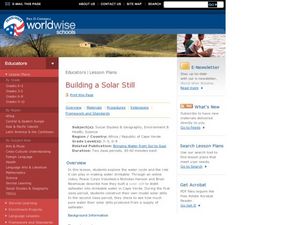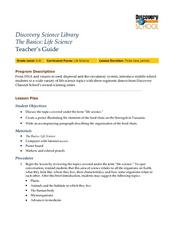Curated OER
Reading Comprehension
What reading strategies improve comprehension? Give your class a few strategies to try while they read this short passage on education and science. Then, have them complete the multiple choice questions that follow. The answers are...
Colorado Unit Writing Project
Fun with Phonemic Awareness
The phonemic awareness activities in this packet are designed to help kids develop skills in rhyming, syllabication, blending onsets and rimes, and beginning and ending sounds. Well worth a place in your curriculum library.
Santa Monica College
The Properties of Oxygen Gas
Scholars generate and collect pure oxygen through a decomposition reaction of hydrogen peroxide in the fourth lesson of an 11-part series. Then, they complete six investigations into the properties of oxygen.
Curated OER
Parts of a Cell
Simplify the parts of a cell with this handout and brief activity. Learners read a two-page explanation of the parts of a cell that includes bolded vocabulary words. Using what they have just read, class members answer 19...
K12 Reader
Food Is Our Fuel
After studying a short article about how living things fuel their growth, readers respond to a series of comprehension questions based on the article.
Curated OER
What Role Does Light Play Within the Vision Process?
Students are introduced to the relationship between light and vision. In groups, they participate in experiments to discover how different wavelengths are divided in the visible spectrum. They record their answers and discuss their...
Curated OER
Fatty Acids
Identify the properties of fats and lipids. Compare the properties of saturated and unsaturated fatty acids Identify foods containing triglycerides and identify which foods contain saturated and unsaturated fat Discuss the function of...
Curated OER
Pesticides
Learners investigate the uses of pesticides and the pros and cons of their use. In this pesticides lesson plan, students observe simulations of the three classes of pesticides and the effects or actions each has. Learners answer 3 follow...
Curated OER
Sprinkles
In this science worksheet, students read a water trip rebus. Pictures replace several of the words in the article. They color a picture of the water cycle and add arrows to show the direction the water is moving. Students draw a picture...
Curated OER
Proteins
Students conduct a variety of experiments to explore protein. In this biology lesson, students solve a mystery by testing for the presence of glucose, protein starch and triglycerides. They explain how DNA transcription and translation...
Curated OER
Health Issues Related to Space Experiments
Learners participate in a science lesson that integrates connections between health issues on Earth and how those issues are related to studies conducted on the International Space Station. T
Oklahoma Ag in The Classroom
Bee Smart Bee Happy
Here is a wonderfully designed instructional activity on bees and pollination designed for early elementary learners. After a class discussion on bees, pupils pretend to be a bee by picking up nectar off of "flowers" in the class. The...
University of Minnesota
Mirroring Emotions
Do you ever give your class the "teacher look"? Without saying a word, they become silent and engaged (hopefully). How do they know what you're thinking? Explore the concept of nonverbal communication and how it relates to our...
Curated OER
World of the Pond
Field trip! The class will review what they know about organisms that dwell in freshwater ponds, then trek down to the old water hole to collect specimens for examination. This includes several web links, useful tips, and an excellent...
Curated OER
Building A Solar Still
Students investigate the water cycle by viewing an online video. In this drinking water lesson, students create solar stills at their campus in order to purify water that is tainted. Students view a video on their computers...
Outdoor Learning Center
Outdoor Survival
Which of the following can you survive without for the longest time: water, food, or a positive mental attitude? The answer may surprise you. Guide learners of all ages through games, activities, and discussions about surviving in the...
Curated OER
it's Lonely At The Top
Students explore the differnences between food producers in food webs and food consumers in food chains. Behavioral choices of primary and secondary consumers such as herbivores, vegetarians, carnivors, and omnivors are analyzed.
California Academy of Science
Pollution in Our Watershed
The concept of a how pesticides and other chemicals pass through a watershed can be difficult for younger learners to grasp without a concrete example. In the activity here, some blank paper, markers, and a spray bottle are all you need...
American Museum of Natural History
What's the Big Deal About Water?
It may seem simple, but water is one of the most unique substances on Earth. An interactive online lesson describes its properties and importance in so many different situations. Learners interact with the lesson to learn the role water...
University of Minnesota
Sheep Brain Dissection
Bored with frog and earthworm dissections? Had your fill of fetal pigs? Anatomy young scholars will be intrigued by the sheep's brain, and you will be prepared with guiding questions, extension activities, and pictures as they dissect...
Curated OER
Science
Third graders study light and shadow, participate in mirror activities, and build a periscope.
Curated OER
Time Lapse Seed Germination with the QX3 Intel Digital Microscope
Young scholars use the time-lapse feature of the QX3 Intel Digital Microscope
to observe germination of seeds. They use the QX3 Intel Digital microscope to create time lapse video films of seed germination experiments.
Curated OER
Monitoring Oxygen Level
Students measure oxygen percentages in room air and air exhaled after they perform various activities. They explore various websites, and record and analyze the data from the experiments.
Curated OER
The Basics: Life Science
Young scholars develop an understanding of the different fields of study that are encompassed by the term, life science. They view and discuss a video on the topic. In small groups they focus on on of the examples shown in the video to...



